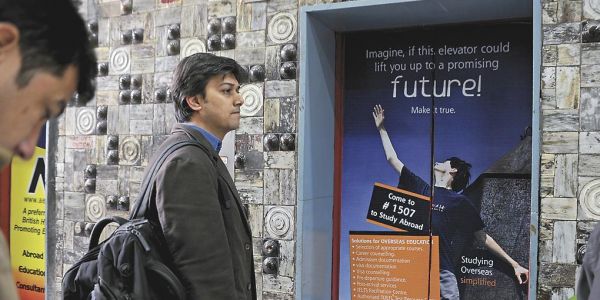Most importantly, they need to follow a legitimate path in pursuit of money, excellence, and exercise necessary precaution to avoid getting duped, lest they have their wings clipped, their beaks bent, claws tagged, ankles radio-tagged and their flight monitored by immigration authorities.
Recently, the news of the Trivalley University hit headlines and most prominently the Indian students looking up to brighter opportunities abroad felt the heat.
 (Image : In New Delhi, advertisements of study abroad are found everywhere. India's colleges can accommodate only 12% of its college-age population)
(Image : In New Delhi, advertisements of study abroad are found everywhere. India's colleges can accommodate only 12% of its college-age population)The UNDP (United Nations Development Programme) estimates that India loses $2 billion a year because of the emigration of computer experts to the U.S. Indian students going abroad for their higher studies costs India a foreign exchange outflow of $10 billion annually. Although India faces large outflow of intellectuals, the government nearly takes no measures to curb this situation, because the Indian government believes that the outflow of intellectuals is not necessarily bad for India. These Indian overseas will benefit India one day eventually. On the other hand, the Indian government makes great efforts to prevent the outflow of capitals.
The recent case of Trivalley University in California that offered bogus degrees and spurious methods of obtaining immigration to the United States must serve as an eye opener to aspiring foreign degree seekers. The Times of India has reported that an estimated 1,500 students have incurred severe financial setbacks, loss of credit and face after enrolling with Trivalley. Of the more than 1,500 international students enrolled at the university, 95 percent were Indian nationals. And more than half were reported in information submitted to the government by Tri-Valley administrators to be residing in a single apartment,according to the complaint. The sham or bogus University lured students on the basis of waiving the GRE/GMAT tests and fraudulently providing optional practical training that serves as the primary step towards immigration. Succumbing to temptation, these students now bear the humiliation of being radio tagged by the United States Immigration authorities.
If the student has pursued the competitive path to secure admission in foreign universities, there is not much to worry. These Indian students frequently twinkle the most in a star-studded foreign sky. The problem arises when one has not followed a competitive path and has dished out several thousands of dollars to unknown universities. Unknown foreign universities are allowed to set up promotion stalls in major and second tier cities across the length and breadth of India without any validation of either the courses and programs offered or a check on the campus recruitment promises. Sense must remind us that a good university does not require vulgar amounts of marketing. Credibility of the universities can be easily checked on the Internet too. It is best to carry out maximum due diligence ourselves.
India sends the maximum number of students to the United States and is the second top source to Australia. Though, Indians with Aussie dreams are mugged, knifed, set alight, and murdered, mostly, in Melbourne, Australia's proud multi-racial melting pot city where people from 140 nations live side-by-side. Well,sticking to the point, an immigration raid on what officials are calling a "sham university" in California is having reverberations in upper levels of the Indian and U.S. governments and will be a topic of discussion when the Indian foreign minister visits Washington this month.
In a federal forfeiture complaint, the US attorney for Northern California accuses Tri-Valley University, outside San Francisco, of making "false statements and misrepresentations" to receive U.S. Department of Homeland Security authorization to issue visa-related documents, and of receiving millions of dollars to help "foreign nationals to illegally obtain student visas in return for tuition fees." However to add, The university, which says it offers degrees in business, engineering, medicine, and other fields, went from enrolling just two international students on visas in early 2009 to 1,555 in the fall of 2010 term. A homeland-security site visit in February 2009 as part of the approval process to grant visas, however, found that the university had capacity for just 30 students. It is unclear what first led homeland-security officials to investigate Tri-Valley, which received government approval to issue visa-related documents in February 2009. Virginia Kice, a spokeswoman for U.S. Immigration and Customs Enforcement, said the agency could not comment on active cases.
Indian government officials have questioned why the university was permitted to operate and have condemned the use of radio-tracking devices used to monitor some of the 1,500 Indian students were enrolled at Tri-Valley and who were detained and released following the investigation. The controversy has also permeated the Indian parliamentary debate over whether to allow American and other foreign universities to open campuses in that country, with some lawmakers asking what protections there will be against fly-by-night institutions.
In a statement, the U.S. Embassy in New Delhi said that ankle bracelets do not "necessarily imply guilt or suspicion of criminal activity" and argued that visa fraud hinders "genuine students" from studying in the United States and takes opportunities from legitimate applicants. The Indian government has set up a dedicated e-mail address to respond to inquiries from affected students. Indian officials have suggested that the foreign students were victims of Tri-Valley's fraud. Under what the government calls a referral and profit-sharing system,international students were able to collect up to 20 percent of the tuition of any new student they referred, the complaint alleges. They could also then collect up to 5 percent of the tuition of students their referred students refer. "A large percentage of foreign nationals" at Tri-Valley, the government alleges, "participate in this referral/profit-sharing scheme."
Wondering why are people glamorized by the West? Any leads?





Comments